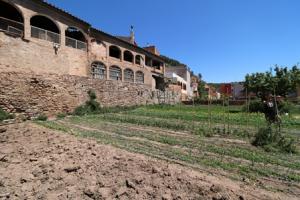| TIPO DE BECA | CODIGO | PAIS | LUGAR | ACTIVIDAD | INICIA | TERMINA |
|---|---|---|---|---|---|---|
| Corto plazo Menores de Edad Senior |
ES-CAT 10.3 | ESPAÑA | Jorba | Agriculture / Environment / Manual | 19/10/2020 | 30/10/2020 |
Eixarcolant - another food model system is possible. Horticulture and reconstuction in the orchards of Jorba.
Camp code:
ES-CAT 10.3
Country:
Spain - Catalunya
Start Date:
19 OCT 2020
End Date:
30 OCT 2020
Topic:
10: Environment protection
Work Types:
Agriculture / Environment / Manual
Number of volunteers:
12
InterNational age:
16 - 99
Required Language:
English
Spoken Language:
English
Motivation letter:
This camp requires an additional motivation letter to explain in more detail why you would like to attend.
Description: The Eixarcolant Collective is a non-profit organization whose aims is to transform the model of production, distribution and consumption of food towards a more sustainable and fair system, thus facing challenges that affect us all as a society and which are key to the present and future well-being. The tools we use to achieve these objectives are preserving edible wild plants and traditional agricultural varieties. We work on education and dissemination, applied research, territorial revitalization, awareness rising and advocacy. There is no specific knowledge required apart from the willingness to learn about plants, crops and work in the countryside. If you are interested in nature preservation, alternative lifestyle and teamwork this workcamp is for you.
Type of Work: The first part of the project is the recovery and revitalization of orchards in Jorba, where volunteers will do tasks connected to the reconstruction such as repairing dry stone huts and opening old ways now lost. Participants will also have a chance to interact with children from the local school and assist them in work related to gardening. The second part of the project is focused on a seeds bank of traditional crop varieties and wild species, where volunteers will assist in various tasks of plantation and growing of the crop species, also collecting the seeds and their subsequent processing. Participants need to bring comfortable clothes to work in the field and appropriate footwear, as well as hat and sunglasses for the sun protection.
Study Theme: There will be several excursions and workshops where participants will acquire knowledge about ethnobotany applied to the change of agri-food model. Volunteers will also learn how to make daily life more sustainable and resilient to climate change. During the work-camp, the host organisation will cover topics such as crop abandonment, rural depopulation, and food sovereignty.
- Ethnobotany
- Horticulture
- Revitalization planning
- Food production and consumption
- Natural area restoration
Accommodation: Volunteers will be accommodated in a local community space (mixed space). It is necessary to bring a sleeping bag. Volunteers will cook taking turns and they will take responsibility for doing the shopping. Bearing in mind that it is a workcamp focused on sustainability, whenever possible, volunteers will be encouraged and advised to consume local food from the orchard or local stores. The diet will be mainly vegetarian throughout the duration of the workcamp.
Language: English, Spanish, Catalan, French, German
Requirements: motivational letter
Approximate Location: Jorba
Organization Description: SCI Catalunya is the Catalan branch of SCI, one of the 2 SCI branches in Spain. We are based in Barcelona and our working area covers the Catalan countries (including Catalonia, Valencia, the Balearic Islands and Andorra). The other provinces of Spain are covered by SCI Madrid. SCI was founded in 1982 and he organization works on both a global and local level. On the global level, we organize international workcamps in the above mentioned territory Long Term Voluntary Projects (including EVS), trainings and seminars. . On the local level, we work to promote peaceful social transformation of society in order to encourage sustainable human development and a culture of peace, through volunteer groups, involving our community and local networks.
-
DISPONIBLE PARA
-
DOCUMENTOS ADICIONALES REQUERIDOS
- Carta de Motivos Específica en Inglés descarga aquí llénalo y guárdalo como PDF para adjuntarlo en tu aplicación
-
VIVE FINANCE
Esta beca cuenta con financiamiento para boleto de avión
-
VIVE ASSIST
Adquiere tu seguro de viajero, VIVE ASSIST te ofrece tarifas preferenciales para adquirir tu seguro de viajero, asistencia de viaje 24/7, médica, personal y legal. Así mismo este programa te apoya a resolver todas las dudas sobre tus traslados al lugar donde fuiste aceptado, te dan orientación sobre vuelos, trenes y todo lo que necesites saber sobre tu viaje.


